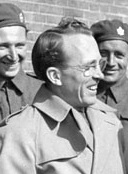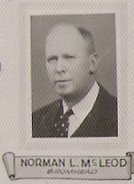
Thomas Clement Douglas was a Scottish-born Canadian politician who served as seventh premier of Saskatchewan from 1944 to 1961 and Leader of the New Democratic Party from 1961 to 1971. A Baptist minister, he was elected to the House of Commons of Canada in 1935 as a member of the Co-operative Commonwealth Federation (CCF). He left federal politics to become Leader of the Saskatchewan Co-operative Commonwealth Federation and then the seventh Premier of Saskatchewan. His government introduced the continent's first single-payer, universal health care program.

The Saskatchewan Party is a centre-right political party in the Canadian province of Saskatchewan. Since 2007, it has been the province's governing party; both the party and the province are currently led by Premier Scott Moe. The party was established in 1997 by a coalition of former provincial Progressive Conservative and Liberal party members and supporters who sought to remove the Saskatchewan New Democratic Party (NDP) from power.

Walter Scott was the first premier of Saskatchewan from 1905 to 1916.
Wilbert Ross Thatcher, was the ninth premier of Saskatchewan, serving from May 22, 1964 to June 30, 1971. He led the Saskatchewan Liberal Party in four general elections, in 1960, 1964, 1967 and 1971. Thatcher was defeated in his first election in 1960, but won the next two elections in 1964 and 1967 with majority governments. Following his defeat in the general election of 1971, he retired from politics and died shortly afterwards.

The Saskatchewan Liberal Party is a liberal political party in the Canadian province of Saskatchewan.
The Saskatchewan New Democratic Party (NDP) is a social-democratic political party in the Canadian province of Saskatchewan. It currently forms the official opposition, but has been a dominant force in Saskatchewan politics since the 1940s. The party is the successor to the Saskatchewan section of the Co-operative Commonwealth Federation (CCF), and is affiliated with the federal New Democratic Party.

Major James William Coldwell, usually known as M. J. Coldwell, was a Canadian democratic socialist politician, and leader of the Co-operative Commonwealth Federation (CCF) party from 1942 to 1960.
There have been various groups in Canada that have nominated candidates under the label Labour Party or Independent Labour Party, or other variations from the 1870s until the 1960s. These were usually local or provincial groups using the Labour Party or Independent Labour Party name, backed by local labour councils made up of many union locals in a particular city, or individual trade unions. There was an attempt to create a national Canadian Labour Party in the late 1910s and in the 1920s, but these were only partly successful.

The Progressive Conservative Party of Saskatchewan is a conservative political party in the Canadian province of Saskatchewan. Prior to 1942, it was known as the Conservative Party of Saskatchewan. Members are commonly known as Tories.

Woodrow Stanley Lloyd was a Canadian politician and educator. Born in Saskatchewan in 1913, he became a teacher in the early 1930s. He worked as a teacher and school principal until 1944 and was involved with the Saskatchewan Teachers' Federation, eventually becoming its president.

William Melville Martin served as the second premier of Saskatchewan from 1916 to 1922. In 1916, although not a member of the Legislative Assembly of Saskatchewan, Martin was elected leader of the Saskatchewan Liberal Party, succeeding Premier Walter Scott and thus became Premier of Saskatchewan.

The 1938 Saskatchewan general election was held on June 8, 1938, to elect members of the Legislative Assembly of Saskatchewan.

The 1944 Saskatchewan general election was held on June 15, 1944 to elect members of the Legislative Assembly of Saskatchewan.

The 1964 Saskatchewan general election was held on April 22, 1964, to elect members of the Legislative Assembly of Saskatchewan.
Clarence Melvin Fines was a Canadian politician, teacher and union leader. He was provincial treasurer of the province of Saskatchewan during the Tommy Douglas era, and also served as Deputy Premier.

Politics of Saskatchewan relate to the Canadian federal political system, along with the other Canadian provinces. Saskatchewan has a lieutenant-governor, who is the representative of the Crown in right of Saskatchewan; premier, Scott Moe, leading the Cabinet; and a unicameral legislature.
Joseph William Burton was a Canadian politician and farmer.

Norman Leslie McLeod was a teacher, and school principal in Unity Saskatchewan, and a farmer, merchant and political figure in Estevan Saskatchewan. He was a member of the legislative assembly of Saskatchewan for Estevan area ridings. He represented Estevan from 1931 to 1932 and from 1934 to 1938 and he represented Souris-Estevan from 1938 to 1944 in the Legislative Assembly of Saskatchewan as a Liberal.
John Frederick Herman was a farmer and political figure in Saskatchewan. He represented Melville from 1938 to 1944 in the Legislative Assembly of Saskatchewan as a Social Credit member.











